Sir John Monash, Personal Files Book 12, 3 April - 30 April 1916, Part 8
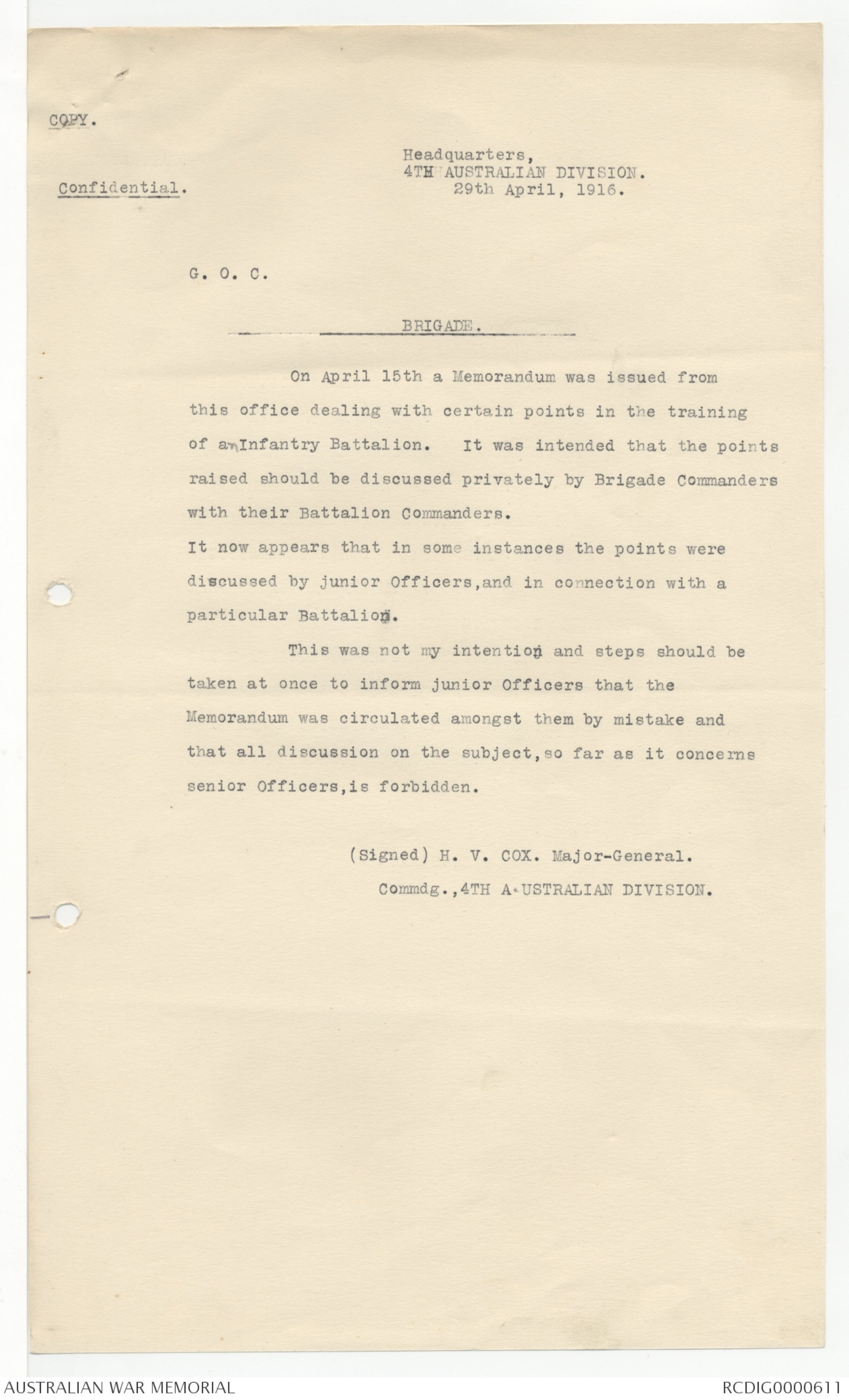
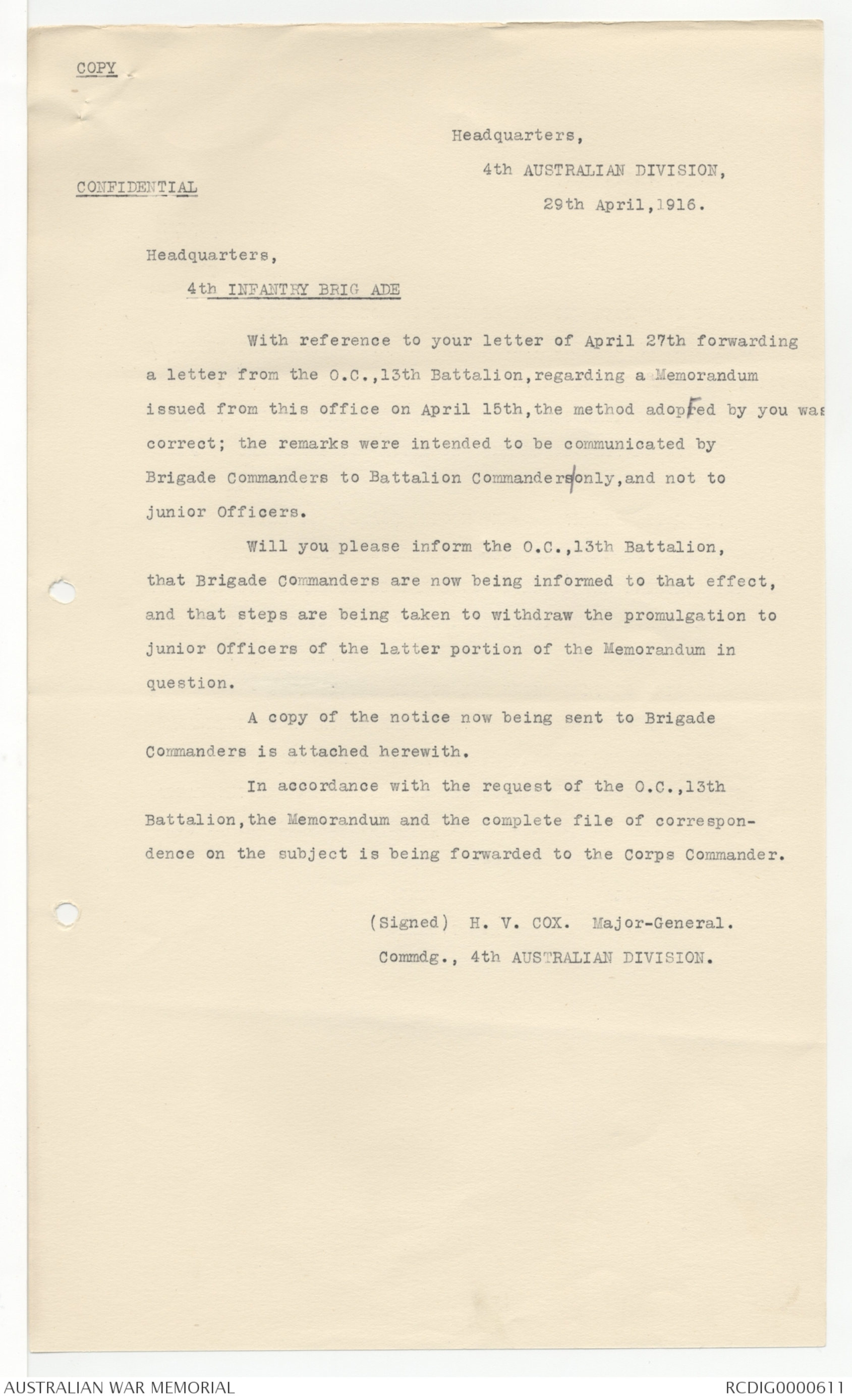
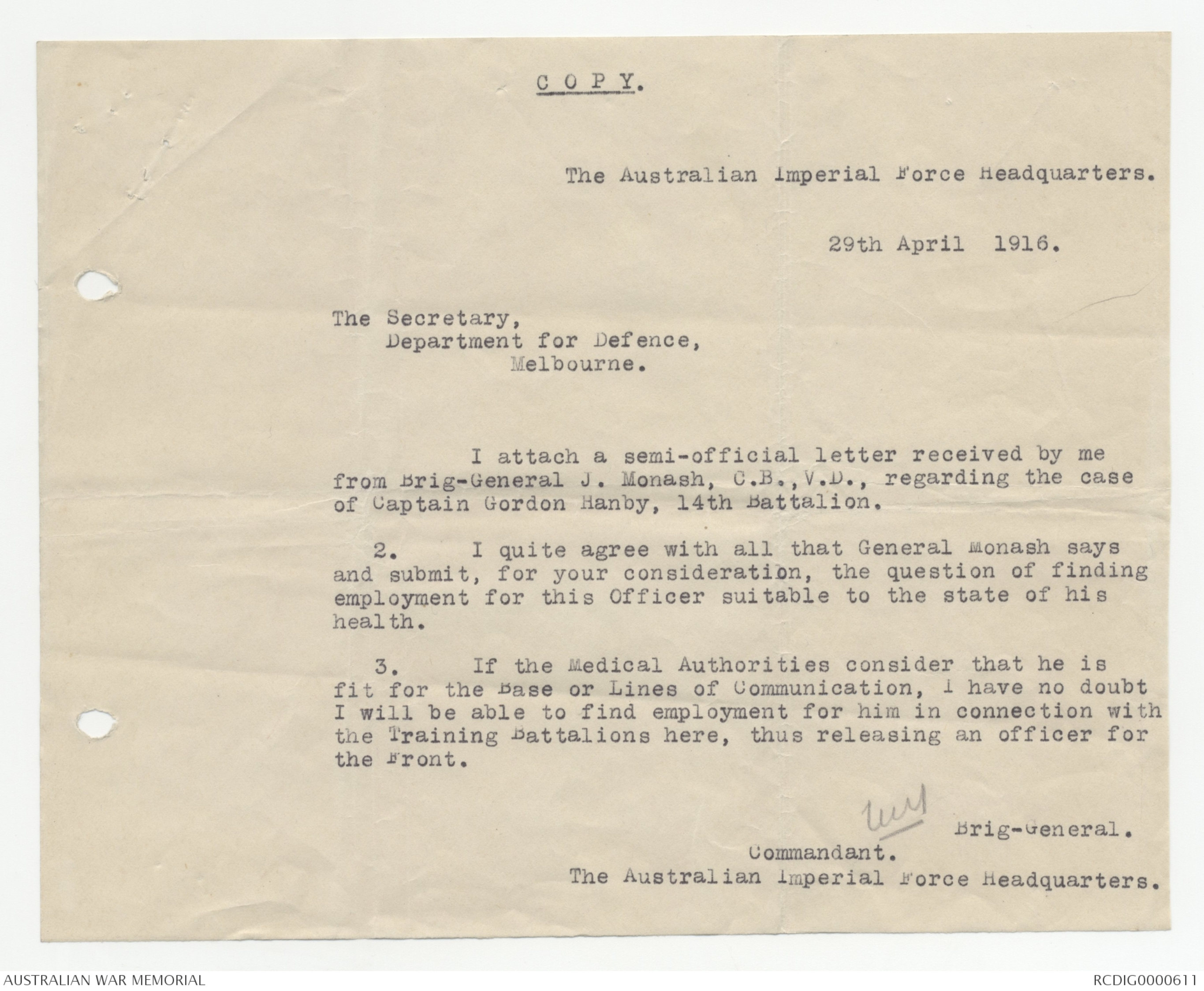
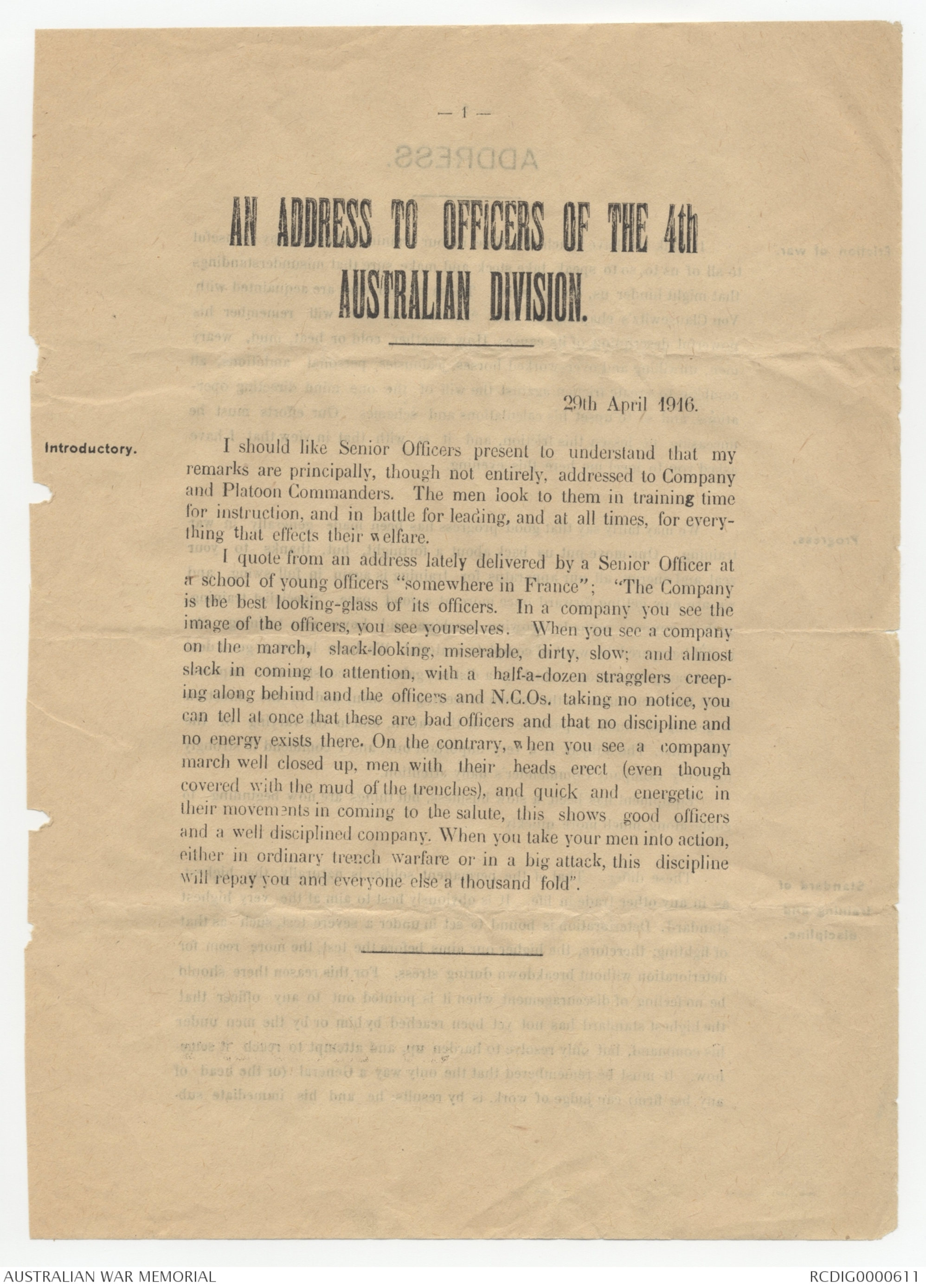
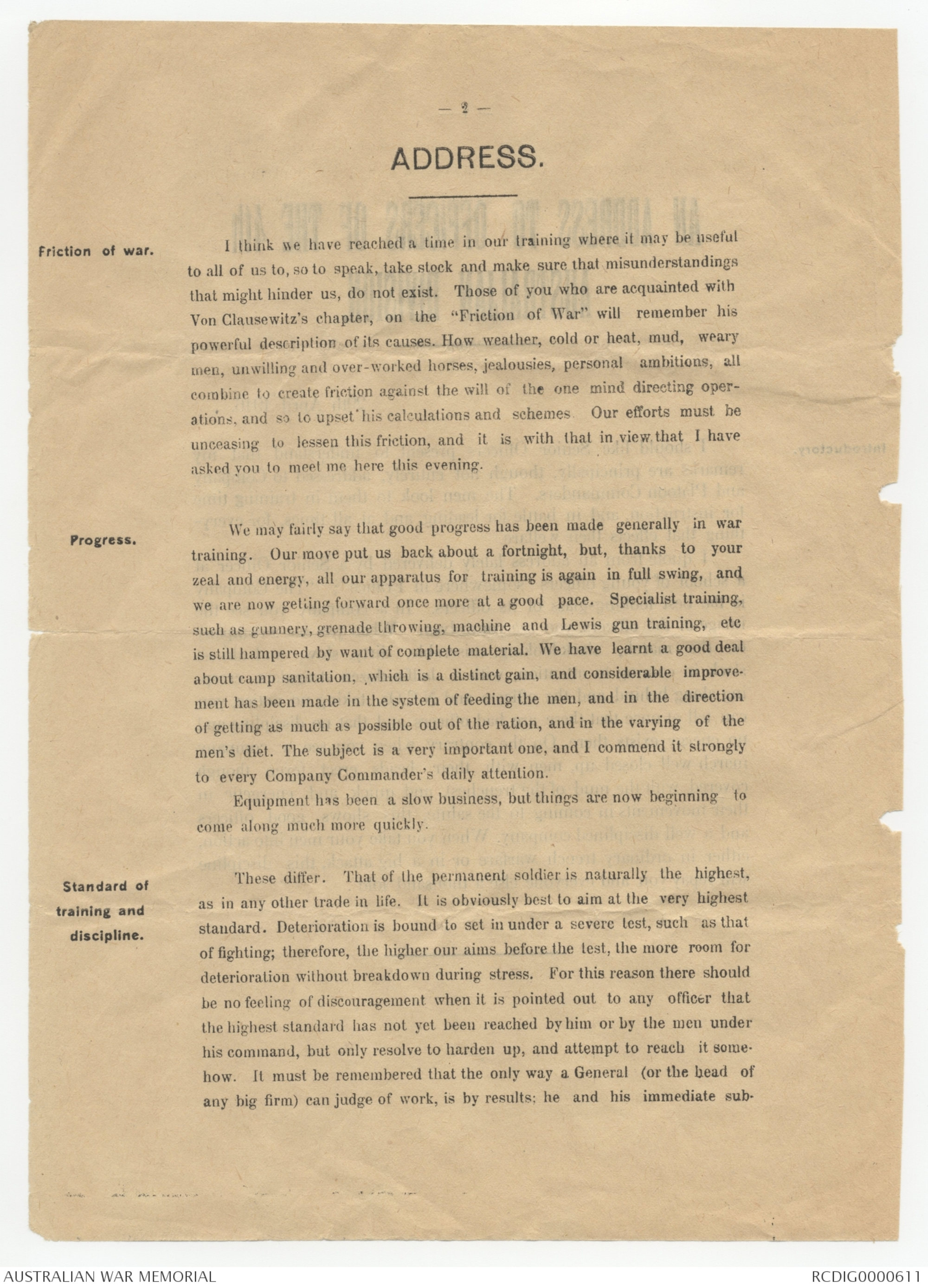
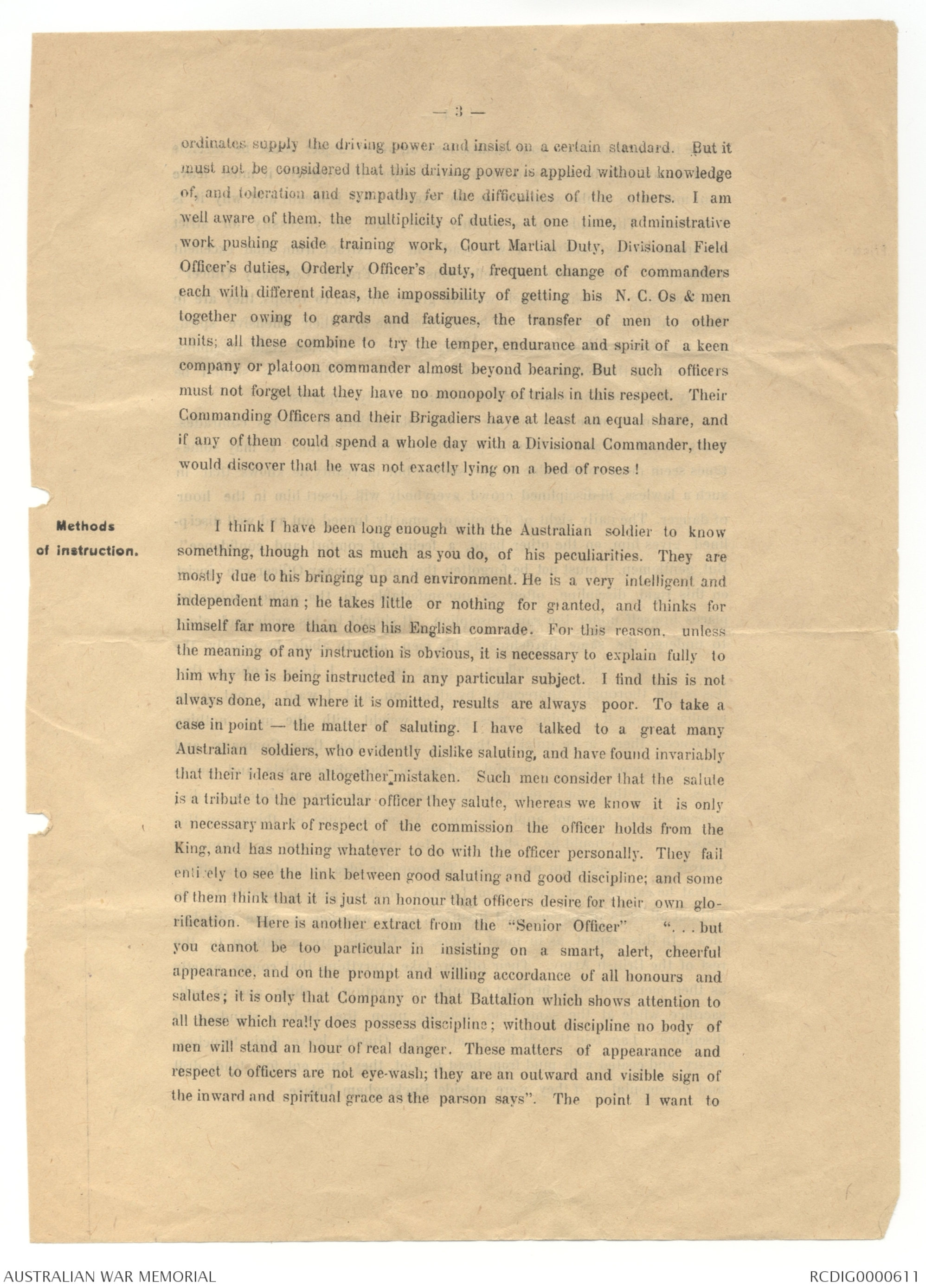
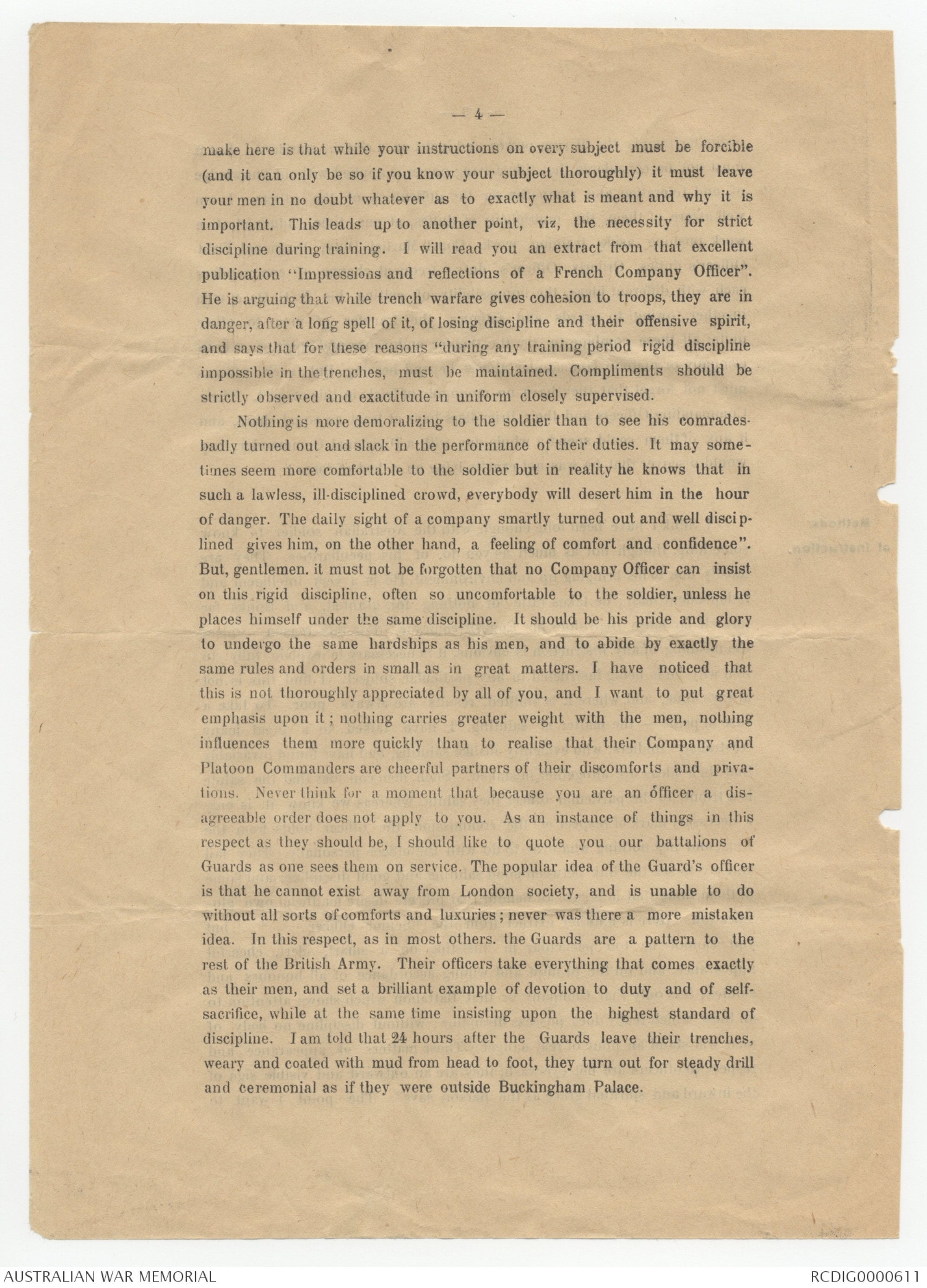
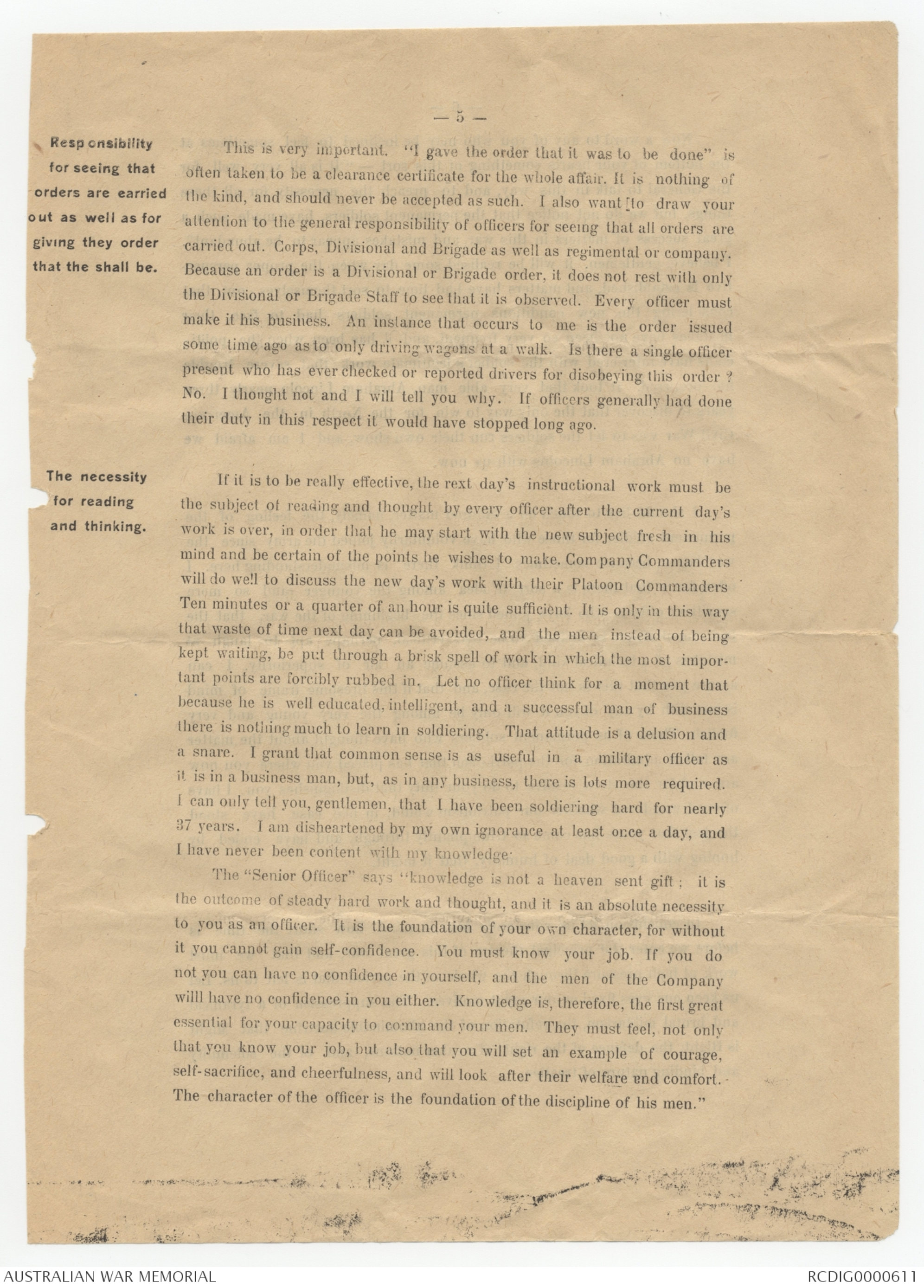
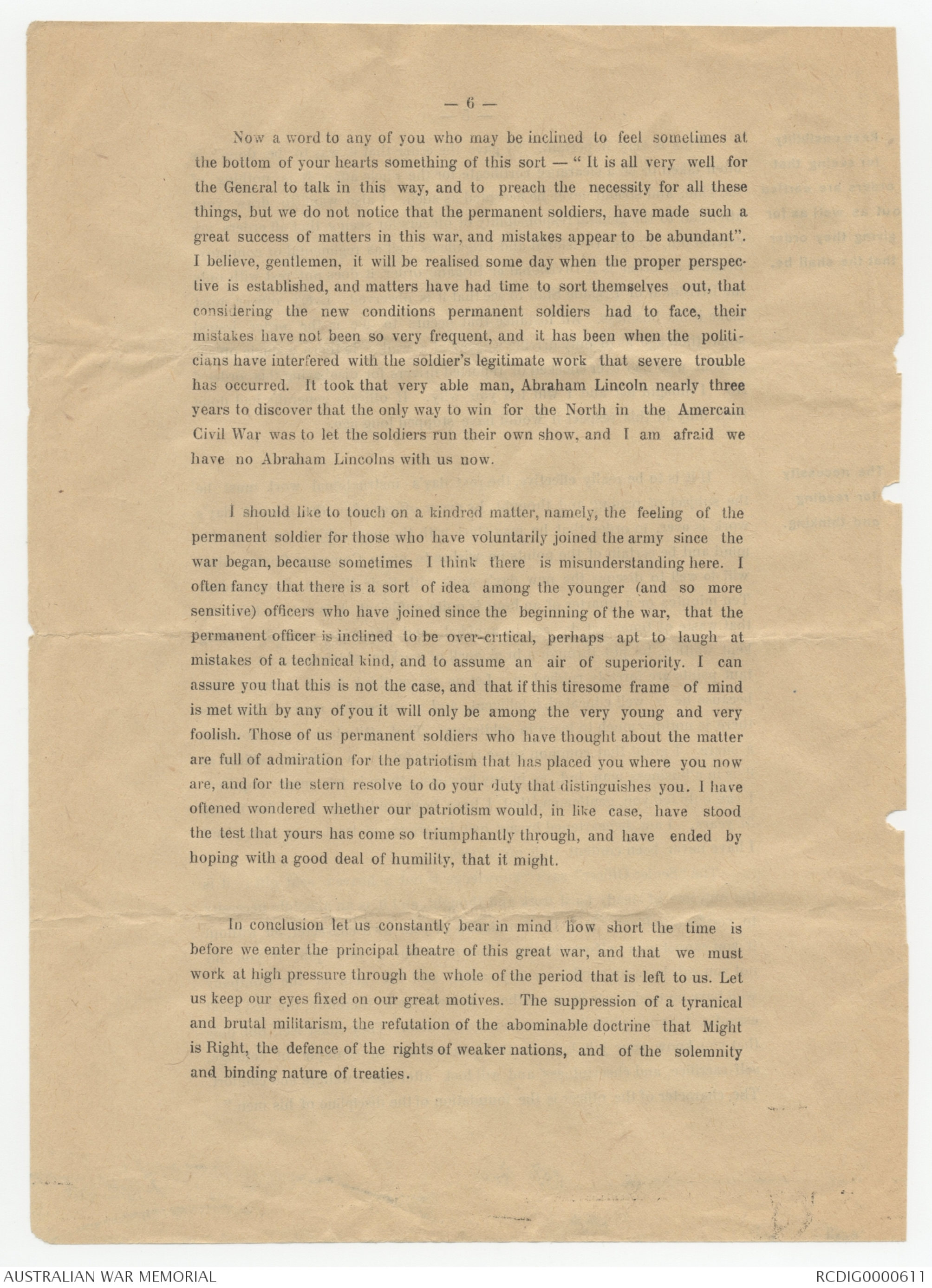
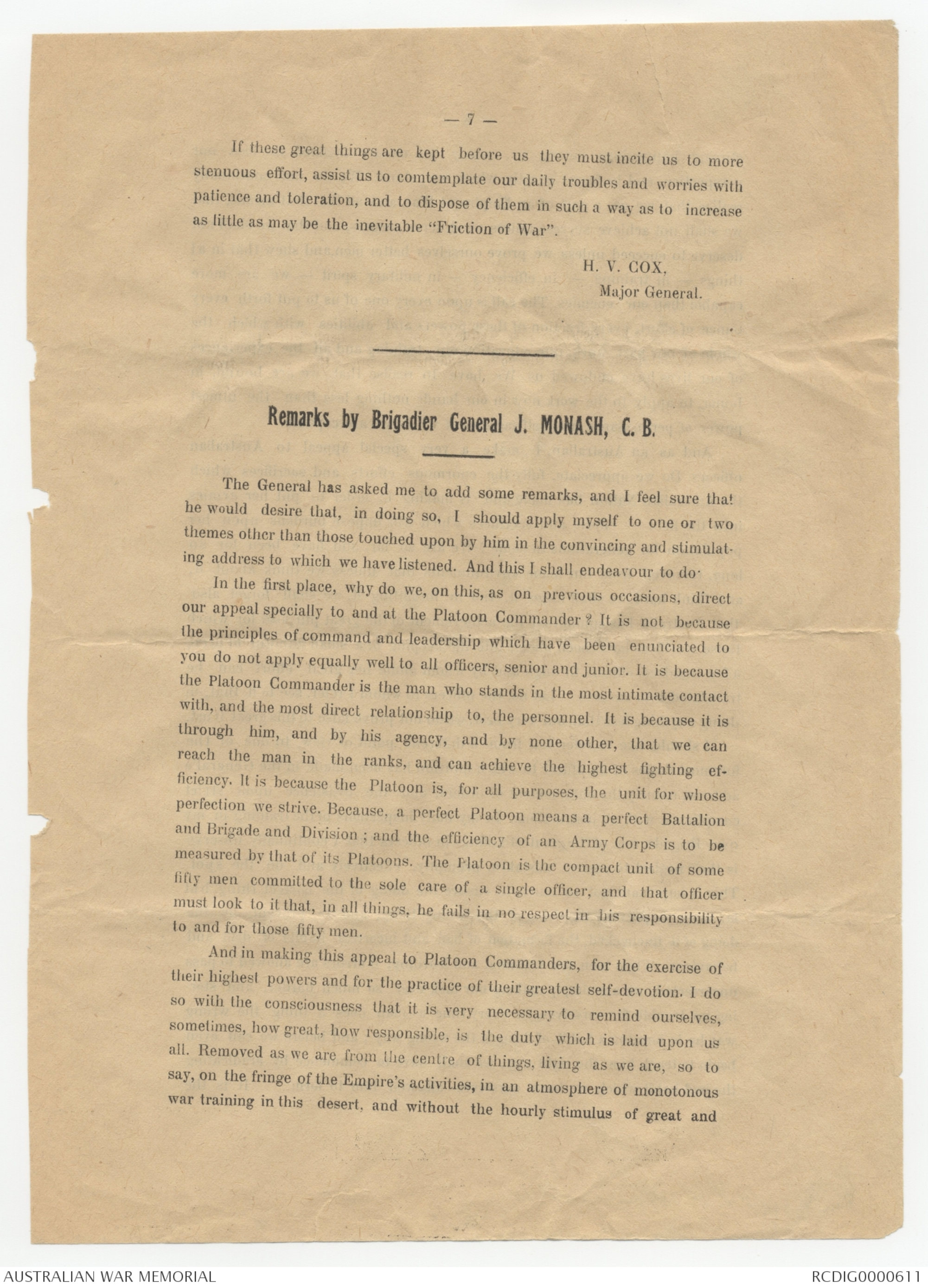
COPY.
Headquarters,
4TH AUSTRALIAN DIVISION.
29th April, 1916.
Confidential.
G. O. C.
BRIGADE.
On April 15th a Memorandum was issued from
this office dealing with certain points in the training
of anInfantry Battalion. It was intended that the points
raised should be discussed privately by Brigade Commanders
with their Battalion Commanders.
It now appears that in some instances the points were
discussed by junior Officers,and in connection with a
particular Battalion.
This was not my intention and steps should be
taken at once to inform junior Officers that the
Memorandum was circulated amongst them by mistake and
that all discussion on the subject, so far as it concerns
senior Officers,is forbidden.
(Signed) H. V. COX. Major-General.
Commdg. ,4TH A-USTRALIAN DIVISION.
COPY
Headquarters,
4th AUSTRALIAN DIVISION,
29th April,1916.
CONFIDENTIAL
Headquarters,
4th INFANTRY BRIG ADE
With reference to your letter of April 27th forwarding
a letter from the O.C., 13th Battalion, regarding a Memorandum
issued from this office on April 15th, the method adoprted by you was
correct; the remarks were intended to be communicated by
Brigade Commanders to Battalion Commanders/only,and not to
junior Officers.
Will you please inform the O.C.,13th Battalion,
that Brigade Commanders are now being informed to that effect,
and that steps are being taken to withdraw the promulgation to
junior Officers of the latter portion of the Memorandum in
question.
A copy of the notice now being sent to Brigade
Commanders is attached herewith.
In accordance with the request of the O.C.,13th
Battalion,the Memorandum and the complete file of correspondence
on the subject is being forwarded to the Corps Commander.
(Signed) H. V. COX. Major-General.
Commdg., 4th AUSTRALIAN DIVISION.
COPY.
The Australian Imperial Force Headquarters.
29th April 1916.
The Secretary,
Department for Defence,
Melbourne.
I attach a semi-official letter received by me
from Brig-General J. Monash, C.B., V.D., regarding the case
of Captain Gordon Hanby, 14th Battalion.
2. I quite agree with all that General Monash says
and submit, for your consideration, the question of finding
employment for this Officer suitable to the state of his
health.
3. If the Medical Authorities consider that he is
fit for the Base or Lines of Communication, I have no doubt
I will be able to find employment for him in connection with
the Training Battalions here, thus releasing an officer for
the Front.
[[?]] Brig-General.
Commandant.
The Australian Imperial Force Headquarters.
-1-
AN ADDRESS TO OFFICERS OF THE 4th
AUSTRALIAN DIVISION.
29th April 1916.
Introductory. I should like Senior Officers present to understand that my
remarks are principally, though not entirely, addressed to Company
and Platoon Commanders. The men look to them in training time
for instruction, and in battle for leading, and at all times, for everything
that effects their welfare.
I quote from an address lately delivered by a Senior Officer at
a school of young officers "somewhere in France"; "The Company
is the best looking-glass of its officers. In a company you see the
image of the officers, you see yourselves. When you see a company
on the march, slack-looking, miserable, dirty, slow; and almost
slack in coming to attention, with half-a-dozen stragglers creeping
along behind and the officers and N.C.Os taking no notice, you
can tell at once that these are bad officers and that no discipline and
no energy exists there. On the contrary, when you see a company
march well closed up, men with their heads erect (even though
covered with the mud of the trenches), and quick and energetic in
their movements in coming to the salute, this shows good officers
and a well disciplined company. When you take your men into action,
either in ordinary trench warfare or in a big attack, this discipline
will repay you and everyone else a thousand fold".
______________________________
-2-
ADDRESS.
Friction of war. I think we have reached a time in our training where it may be useful
to all of us to, so to speak, take stock and make sure that misunderstandings
that might hinder us, do not exist. Those of you who are acquainted with
Von Clausewitz's chapter, on the "Friction of War" will remember his
powerful description of its causes. How weather, cold or heat, mud, weary
men, unwilling and over-worked horses, jealousies, personal ambitions, all
combine to create friction against the will of the one mind directing operations,
and so to upset his calculations and schemes. Our efforts must be
unceasing to lessen this friction, and it is with that in view that I have
asked you to meet me here this evening.
Progress. We may fairly say that good progress has been made generally in war
training. Our move put us back about a fortnight, but, thanks to your
zeal and energy, all our apparatus for training is again in full swing, and
we are now getting forward once more at a good pace. Specialist training,
such as gunnery, grenade throwing, machine and Lewis gun training, etc
is still hampered by want of complete material. We have learnt a good deal
about camp sanitation, which is a distinct gain, and considerable improvement
has been made in the system of feeding the men, and in the direction
of getting as much as possible out of the ration, and in the varying of the
men's diet. The subject is a very important one, and I commend it strongly
to every Company Commander's daily attention.
Equipment has been a slow business, but things are now beginning to
come along much more quickly.
Standard of training and discipline. These differ. That of the permanent soldier is naturally the highest,
as in any other trade in life. It is obviously best to aim at the very highest
standard. Deterioration is bound to set in under a severe test, such as that
of fighting; therefore, the higher our aims before the test, the more room for
deterioration without breaking down during stress. For this reason there should
be no feeling of discouragement when it is pointed out to any officer that
the highest standard has not yet been reached by him or by the men under
his command, but only resolve to harden up, and attempt to reach it somehow.
It must be remembered that the only way a General (or the head of
any big firm) can judge of work, is by results; he and his immediate
-3-
subordinates supply the driving power and insist on a certain standard. But it
must not be considered that this driving power is applied without knowledge
of, and toleration and sympathy for the difficulties of the others. I am
well aware of them, the multiplicity of duties, at one time, administrative
work pushing aside training work, Court Martial Duty, Divisional Field
Officer's duties, Orderly Officer's duty, frequent change of commanders
each with different ideas, the impossibility of getting his N. C. Os & men
together owing to gards and fatigues, the transfer of men to other
units; all these combine to try the temper, endurance and spirit of a keen
company or platoon commander almost beyond bearing. But such officers
must not forget that they have no monopoly of trials in this respect. Their
Commanding Officers and their Brigadiers have at least an equal share, and
if any of them could spend a whole day with a Divisional Commander, they
would discover that he was not exactly lying on a bed of roses !
Methods of instruction. I think I have been long enough with the Australian soldier to know
something, though not as much as you do, of his peculiarities. They are
mostly due to his bringing up and environment. He is a very intelligent and
independent man ; he takes little or nothing for granted, and thinks for
himself far more than does his English comrade. For this reason, unless
the meaning of any instruction is obvious, it is necessary to explain fully to
him why he is being instructed in any particular subject. I find this is not
always done, and where it is omitted, results are always poor. To take a
case in point - the matter of saluting. I have talked to a great many
Australian soldiers, who evidently dislike saluting, and have found invariably
that their ideas are altogether mistaken. Such men consider that the salute
is a tribute to the particular officer they salute, whereas we know it is only
a necessary mark of respect of the commission the officer holds from the
King, and has nothing whatever to do with the officer personally. They fail
entirely to see the link between good saluting and good discipline; and some
of them think that it is just an honour that officers desire for their own glorification.
Here is another extract from the "Senior Officer" "...but
you cannot be too particular in insisting on a smart, alert, cheerful
appearance, and on the prompt and willing accordance of all honours and
salutes; it is only that Company or that Battalion which shows attention to
all these which really does possess discipline ; without discipline no body of
men will stand an hour of real danger. These matters of appearance and
respect to officers are not eye-wash; they are an outward and visible sign of
the inward and spiritual grace as the parson says". The point I want to
-4-
make here is that while your instructions on every subject must be forcible
(and it can only be so if you know your subject thoroughly) it must leave
your men in no doubt whatever as to exactly what is meant and why it is
important. This leads up to another point, viz, the necessity for strict
discipline during training. I will read you an extract from that excellent
publication "Impressions and reflection of a French Company Officer".
He is arguing that while trench warfare gives cohesion to troops, they are in
danger, after a long spell of it, of losing discipline and their offensive spirit,
and says that for these reasons "during any training period rigid discipline
impossible in trenches, must be maintained. Compliments should be
strictly observed and exactitude in uniform closely supervised.
Nothing is more demoralizing to the soldier than to see his comrades
badly turned out and slack in the performance of their duties. It may sometimes
seem more comfortable to the soldier but in reality he knows that in
such a lawless, ill-disciplined crowd, everybody will desert him in the hour
of danger. The daily sight of a company smartly turned out and well disciplined
gives him, on the other hand, a feeling of comfort and confidence".
But, gentlemen. it must not be forgotten than no Company Officer can insist
on this rigid discipline, often so uncomfortable to the soldier, unless he
places himself under the same discipline. It should be his pride and glory
to undergo the same hardships as his men, and to abide by exactly the
same rules and orders in small as in great matters. I have noticed that
this is not thoroughly appreciated by all of you, and I want to put great
emphasis upon it ; nothing carries greater wight with the men, nothing
influences them more quickly than to realise that their Company and
Platoon Commanders are cheerful partners of their discomforts and privations.
Never think for a moment that because you are an officer a disagreeable
order does not apply to you. As an instance of things in this
respect as they should be, I should like to quote you our battalions of
Guards as one sees them on service. The popular idea of the Guard's officer
is that he cannot exist away from London society, and is unable to do
without all sorts of comforts and luxuries ; never was there a more mistaken
idea. In this respect, as in most others. the Guards are a pattern to the
rest of the British Army. Their officers take everything that comes exactly
as their men, and set a brilliant example of devotion to duty and of self-
sacrifice, while at the same time insisting upon the highest standard of
discipline. I am told that 24 hours after the Guards leave their trenches,
weary and coated with mud from head to foot, they turn out for steady drill
and ceremonial as if they were outside Buckingham Palace.
-5-
Responsibility for seeing that orders are carried out as well as for giving they order that the shall be. This is very important. "I gave the order that it was to be done" is
often taken to be a clearance certificate for the whole affair. It is nothing of
the kind, and should never be accepted as such. I also want[to draw your
attention to the general responsibility of officers for seeing that all orders are
carried out. Corps, Divisional and Brigade as well as regimental or company.
Because an order is a Divisional or Brigade order, it does not rest with only
the Divisional or Brigade Staff to see that it is observed. Every officer must
make it his business. An instance that occurs to me is the order issued
some time ago as to only driving wagons at a walk. Is there a single officer
present who has ever checked or reported drivers for disobeying this order?
No. I thought not and will tell you why. If officers generally had done
their duty in this respect it would have stopped long ago.
The necessity for reading and thinking. If it is to be really effective, the next day's instructional work must be
the subject of reading and thought by every officer after the current day's
work is over, in order that he may start with the new subject fresh in his
mind and be certain of the points he wishes to make. Company Commanders
will do well to discuss the new day's work with their Platoon Commanders
Ten minutes or a quarter of an hour is quite sufficient. It is only in this way
that waste of time next day can be avoided, and the men instead of being
kept waiting, be put through a brisk spell of work in which the most important
points are forcibly rubbed in. Let no officer think for a moment that
because he is well educated, intelligent, and a successful man of business
there is nothing much to learn in soldiering. That attitude is a delusion and
a snare. I grant that common sense is as useful in a military officer as
it is in a business man, but, as in any business, there is lots more required.
I can only tell you, gentlemen, that I have been soldiering hard for nearly
37 years. I am disheartened by my own ignorance at least once a day, and
I have never been content with my knowledge.
The "Senior Officer" says "knowledge is not a heaven sent gift ; it is
the outcome of steady hard work and thought, and it is an absolute necessity
to you as an officer. It is the foundation of your own character, for without
it you cannot gain self-confidence. You must know your job. If you do
not you can have no confidence in yourself, and the men of the Company
will have no confidence in you either. Knowledge is, therefore, the first great
essential for your capacity to command your men. They must feel, not only
that you know your job, but also that you will set an example of courage,
self-sacrifice, and cheerfulness, and will look after their welfare and comfort.
The character of the officer is the foundation of the discipline of his men"
-6-
Now a word to any of you who may be inclined to feel sometimes at
the bottom of your hearts something of this sort - "It is all very well for
the General to talk in this way, and to preach the necessity for all these
things, but we do not notice that the permanent soldiers, have made such a
great success of matters in this war, and mistakes appear to be abundant".
I believe, gentlemen, it will be realised some day when the proper perspective
is established, and matters have had time to sort themselves out, that
considering the new conditions permanent soldiers had to face, their
mistakes have not been so very frequent, and it has been when the politicians
have interfered with the soldier's legitimate work that severe trouble
has occurred. It took that very able man, Abraham Lincoln nearly three
years to discover that the only way to win for the North in the Amercain
Civil War was to let the soldiers run their own show, and I am afraid we
have no Abraham Lincoln with us now.
I should like to touch on a kindred matter, namely, the feeling of the
permanent soldier for those who have voluntarily joined the army since the
war began, because sometimes I think there is a misunderstanding here. I
often fancy that there is a sort of idea among the younger (and so more
sensitive) officers who have joined since the beginning of the war, that the
permanent officer is inclined to be over-critical, perhaps apt to laugh at
mistakes of a technical kind, and to assume an air of superiority. I can
assure you that this is not the case, and that if this tiresome frame of mind
is met with by any of you it will only be among the very young and very
foolish. Those of us permanent soldiers who have thought about the matter
are full of admiration for the patriotism that has placed you where you now
are, and for the stern resolve to do your duty that distinguishes you. I have
oftened wondered whether our patriotism would, in like case, have stood
the test that yours has come so triumphantly through, and have ended by
hoping with a good deal of humility, that it might.
In conclusion let us constantly bear in mind how short the time is
before we enter the principal theatre of this great war, and that we must
work at high pressure through the whole of the period that is left to us. Let
us keep our eyes fixed on our great motives. The suppression of a tyranical
and brutal militarism, the refutation of the abominable doctrine that Might
is Right, the defence of the rights of weaker nations, and of the solemnity
and binding nature of treaties.
-7-
If these great things are kept before us they must incite us to more
stenuous effort, assist us to comtemplate our daily troubles and worries with
patience and toleration, and to dispose of them in such a way as to increase
as little as may be the inevitable "Friction of War".
H.V. COX,
Major General
_____________
Remarks by Brigadier General J. MONASH, C.B
_____________
The General has asked me to add some remarks, and I feel sure that
he would desire that, in doing so, I should apply myself to one or two
themes other than those touched upon by him in the convincing and stimulating
address to which we have listened. And this I shall endeavour to do
In the first place, why do we, on this, as on previous occasions, direct
our appeal specially to and at the Platoon Commander ? It is not because
the principles of command and leadership which have been enunciated to
you do not apply equally well to all officers, senior and junior. It is because
the Platoon Commander is the man who stands in the most intimate contact
with, and the most direct relationship to, the personnel. It is because it is
through him, and by his agency, and by none other, that we can
reach the man in the ranks, and can achieve the highest fighting efficiency.
It is because the Platoon is, for all purposes, the unit for whose
perfection we strive. Because a perfect Platoon means a perfect Battalion
and Brigade and Division ; and the efficiency of an Army Corps is to be
measured by that of its Platoons. The Platoon is the compact unit of some
fifty men committed to the sole care of a single officer, and that officer
must look to it that, in all things, he fails in no respect in his responsibility
to and for those fifty men.
And in making this appeal to Platoon Commanders, for the exercise of
their highest powers and for the practice of their greatest self-devotion. I do
so with the consciousness that it is very necessary to remind ourselves,
sometimes, how great, how responsible, is the duty which is laid upon us
all. Removed as we are from the centre of things, living as we are, so to
say, on the fringe of the Empire's activities, in an atmosphere of monotonous
war training in this desert, and without the hourly stimulus of great and
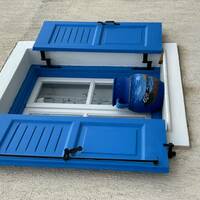 Jen
Jen This transcription item is now locked to you for editing. To release the lock either Save your changes or Cancel.
This lock will be automatically released after 60 minutes of inactivity.